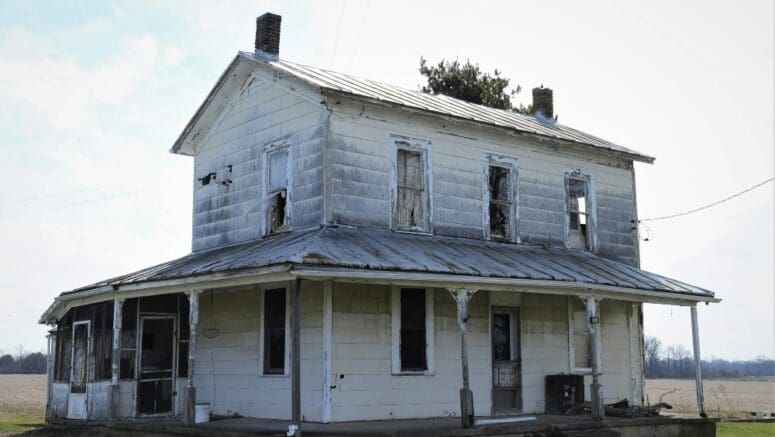‘We Buy Ugly Houses®, Explained:’ 9 Things to Know About the House-Flipping Franchise
- Published on
- 11 min read
-
 Valerie Kalfrin, Contributing AuthorClose
Valerie Kalfrin, Contributing AuthorClose Valerie Kalfrin Contributing Author
Valerie Kalfrin Contributing AuthorValerie Kalfrin is a multiple award-winning journalist, film and fiction fan, and creative storyteller with a knack for detailed, engaging stories.
-
 Sam Dadofalza, Associate EditorClose
Sam Dadofalza, Associate EditorClose Sam Dadofalza Associate Editor
Sam Dadofalza Associate EditorSam Dadofalza is an associate editor at HomeLight, where she crafts insightful stories to guide homebuyers and sellers through the intricacies of real estate transactions. She has previously contributed to digital marketing firms and online business publications, honing her skills in creating engaging and informative content.
The slogan “We Buy Ugly Houses” explained what the famous company does, but what really is the truth behind the catchy phrase and the real estate firm’s business model?
Famous for its ubiquitous yellow billboards along the interstate featuring a shaggy-haired caveman, HomeVestors of America — better known as We Buy Ugly Houses® — has become a household brand in the U.S. The longtime private real estate investing franchise offers homeowners a simple deal: Cash for your home in its current state, no matter how pretty it is or what underlying issues may lurk beneath the surface.
Yet despite the down-to-earth and widespread local marketing of We Buy Ugly Houses®, many people don’t know much about HomeVestors as a company beyond the 800 number they see on those roadside ads. You may wonder: Who represents “we”? And how “ugly” does a house have to be for them to buy it?
As an established player in the cash-buying space, We Buy Ugly Houses® has an interesting history, so we compiled this list of fun and fast facts about the company churned up from the interwebs. Whether you have a dilapidated home, you don’t know what to do with, or you just love to geek out on all things real estate, this primer will fill you in on how this house-flipping franchise started, expanded, and your options for working with companies that pay all-cash for homes in general.
1. We Buy Ugly Houses® was founded by a real estate agent
Selling your house directly to a company such as HomeVestors runs opposite to the conventional listing process, whereby you partner with a real estate agent, primp and prep your house for sale on the open market, and let buyers compete for your home. You’d never guess, then, that HomeVestors and the concept of We Buy Ugly Houses® was created by someone who lived and breathed the traditional way of doing real estate: a practicing Dallas and Houston real estate agent of 20 years named Ken D’Angelo.
2. It started with a late-night infomercial
As the story goes, D’Angelo was inspired by a late-night infomercial touting the inside track on how to buy a home — which put him in the entrepreneurial spirit. With deep knowledge of the industry thanks to his years spent working for brokerages like Red Carpet Realtors and ERA Realtors, D’Angelo saw an opportunity to go where others wouldn’t in real estate, namely, straight toward those houses deemed “ugly” or unworthy of an offer.
So began the foundations of a business built on buying properties at below-market value, renovating them, and re-selling them on the open market — a process D’Angelo would master and develop training systems for that he could then pass on to others. The Texas agent founded the company in 1989 as a one-man flipping business in Dallas-Fort Worth. He began franchising in 1996 after raising $350,000 in a public debt offering.
3. More than 1,000 real estate investor franchisees are employed under the We Buy Ugly Houses® brand
After planting roots in Texas, We Buy Ugly Houses® then franchised in Kansas City and Atlanta, as real estate investors adopted the house-flipping model under a common name in new territories. From there, the business went countrywide. We Buy Ugly Houses® has purchased more than 140,000 houses to date through a network of more than 1,100 independently owned and operated franchises across 46 states and the District of Columbia.
D’Angelo passed away in 2005, and John Hayes, a franchising expert, succeeded him until 2009. In the summer of 2023, David Hicks, who had been with HomeVestors for 18 years, stepped down as the head of the company. Hicks developed the company’s process for coaching franchisees. Under his leadership, in 2020, HomeVestors ranked for the sixth time on the annual Inc. 5000 list of the nation’s fastest-growing private companies, based on 62% growth in revenue over three years.
Leading the company today is Larry Goodman, who brings more than 35 years of real estate experience, including 12 years as the COO of a national multifamily property management firm and 15 years in various roles related to investment and asset management, overseeing a diverse range of commercial and residential assets for pension funds, insurance companies, and high net worth investors. Right now, Larry Goodman is the CEO of HomeVestors.
D’Angelo’s legacy continues through We Buy Ugly Houses®’s continued growth, and the company maintains its Dallas headquarters to this day.
4. The shaggy-haired caveman repping We Buy Ugly Houses® has a name — and a backstory
You may know him as the caveman on those roadside billboards, but he does have a name: Ug Lee. He sports a holey yellow tunic and a bushy brown beard and always carries a bag of cash, ready to buy ugly houses and help homeowners get out of desperate situations. He represents HomeVestor’s dedication to seeing the beauty in what a home could be.
5. From ugly homes to ugly situations, HomeVestors won’t shy away from a property
HomeVestor’s mascot and slogan serve as reminders of the company’s commitment to buying houses fast and easy, regardless of the circumstances. They let sellers know that the company will embrace a home or situation that other buyers find unattractive, such as:
- Homes with roofing, foundation, plumbing, electrical, or other structural issues
- Homes located in a flood plain or other inconvenient location
- Homes with high interest rates or mortgage payments that are too high to handle
- Homes connected with bad memories for the homeowner, such as a divorce or death
- Inherited properties with which the seller may be unfamiliar
More than 80% of the houses purchased by the We Buy Ugly Houses® franchises are less than 1,400 square feet and were built before 1980. Hicks, the former CEO, recalls that the company has taken on homes with major clutter issues, including one that had pet monkeys and another with bats in the attic.
The company conducts the Ugliest House of the Year contest annually. It declared a home transformation in Williamsburg, Virginia, The Ugliest House Of The Year® for 2023. Daniel Nice, a Virginia branch franchisee, clinched the 17th annual contest by showcasing the most remarkable before and after transformations of houses renovated by independently owned and operated franchises in 2023.
The 134-year-old farmhouse on Semple Road in Williamsburg was originally constructed in 1890 as the centerpiece of a 70-acre farm. Over time, the farmhouse fell into neglect, with surrounding vegetation obscuring its visibility from the road as the neighboring land evolved into a residential neighborhood during the 1960s.
The seven-month renovation cost $270,000 and included extensive landscaping, a full gut of the interior, new water and sewer lines, and refinished historical details. You can view more photos of the project here.
6. It took sellers time to trust the simple process of a cash as-is sale
“You’ll buy my house — in any condition? You aren’t going to list it?” In the early days of HomeVestors, sellers were skeptical that HomeVestors would provide an offer for their properties, which, in many cases, were falling apart.
Franchisees had to build trust that their deal was legitimate — i.e., sellers didn’t have to do any work to their homes, and HomeVestors would still pay them something for it.
According to Franchise Business Review, investing in a HomeVestors franchise is a great financial choice. HomeVestors franchise owners love what they do, with 90% enjoying their businesses. The company also excels in supporting its franchisees and has been a top franchise for more than a decade. In 2023, HomeVestors received recognition as a Top Low-Cost and Top Recession-Proof franchise.
7. We Buy Ugly Houses® will base their offer on the level of work required, among other factors
To sell a home through We Buy Ugly Houses®, a homeowner fills out the website contact form or calls the company to connect to a franchise in their area. A representative visits the property, evaluates its condition, and makes a cash offer depending on several factors, including:
- The home’s current condition
- The approximate cost of renovations and repairs
- The time anticipated for renovations and repairs
- The “post-renovation” value compared to other homes in your area
- The costs of maintaining the home until it sells (such as paying for utilities, taxes, and insurance)
- The real estate commissions required to sell the home
Many rehabbers use the flipping industry standard known as the 70% rule, where an investor offers no more than 70% of a property’s after-repair value for a house they plan to flip. They subtract any estimated repair and holding costs from that 70%.
Some offers are negotiable, though. Sometimes, homeowners reject initial offers from We Buy Ugly Houses®, thinking they were too low. However, after talking to a few real estate agents who evaluated the level of repairs needed and the recently sold homes in the area, sellers would reach out again to HomeVestors to discuss and negotiate offers.
Franchisees claim to close on a property within two weeks, helping clients who need to relocate quickly and can’t carry two mortgages.
8. Gather several estimates of your home’s value before selling to any cash buyer, including We Buy Ugly Houses®
The “cash for your home” rehabbing business model has led to what some housing advocates call predatory tactics, particularly toward homeowners in vulnerable situations. Following a ProPublica investigation in 2023, HomeVestors of America changed its policies to include a simplified, single-page disclosure with a three-day window to terminate a sales contract.
Previously, some franchise owners employed deception and high-pressure sales tactics to persuade homeowners to sell their properties well below market value. A segment of the company’s advertising also targeted homeowners facing difficult situations or who didn’t fully understand their home’s worth. According to ProPublica, this included sending mailers to individuals who had recently gotten divorced or experienced a death in the family.
A company spokesperson told ProPublica that HomeVestors has adopted other changes, including “an ethics hotline for franchise owners to report violations” and “a team of ‘brand compliance auditors’ to better police franchise activities.”
ProPublica’s reporting contributed to HomeVestors’ then-CEO David Hicks stepping down in June 2023. The new CEO, Larry Goodman, told the Franchise Times that the company has “formally prohibited franchisee advertising activities that are intrusive” but did not provide specific details.
Before you accept any cash offer, investigate what your home is worth through a comparative market analysis (CMA), which many real estate agents offer for free. Use HomeLight’s Agent Match tool to connect with a top real estate agent experienced in putting together CMAs that objectively show you what your house is worth.
9. We Buy Ugly Houses® isn’t the only route to a quick and low-hassle sale
HomeVestors has become a major franchise offering continuity among real estate investors who purchase homes under the We Buy Ugly Houses® brand. That said, the company isn’t the only means of selling your home for cash, nor are ugly homes the only properties investors may be interested in.
HomeLight developed our Simple Sale option for home sellers, knowing that the convenience of a cash offer appeals to a wide range of sellers, whether they aren’t comfortable showing their home while it’s on the market or need to relocate quickly for a new job in another city.
Through Simple Sale, HomeLight works to match you with an investor in your area who can make a full cash offer on your property within 24 hours so that you can sell your home on your timeline, in as few as 10 days or whenever you’re ready. The cash offer you receive will be competitive, with no hidden fees or agent commission costs involved.
Like selling with We Buy Ugly Houses®, HomeLight Simple Sale allows you to sell a house as is and skip the repairs, prep work, and open houses and go straight to receiving an offer for your house as-is.
However, the Simple Sale platform can also provide offers for people with houses in fair or even great condition who are looking for a fast sale. To make sure you’re receiving a top offer for your home, we’ll compare your Simple Sale cash offer against an estimation of what you could realistically fetch on the open market with the help of a top real estate agent, so you can make an informed decision while weighing your selling priorities.
Header Image Source: (Jim Lukach / Flickr via Creative Commons Legal Code)
- "Inside the ‘Ugliest House’ in America’s Transformation", National Association of REALTORS® (April 2024)
- "HomeVestors® Names The Ugliest House Of The Year® for 2023", Business Wire (February 2024)
- "HomeVestors Bought 10,000 Houses in 2020, Generating Sales of $1.6 Billion", Business Wire (January 2021)
- "HomeVestors Ranks for Sixth Time on Annual Inc. 5000 After Realizing Three-Year Revenue Growth of 62 Percent", Business Wire (September 2020)
- "CEO of Dallas-based ‘We Buy Ugly Houses’ company is stepping aside", The Dallas Morning News (June 2023)






